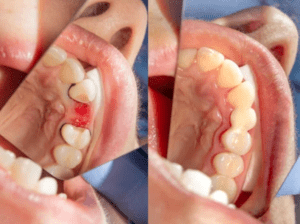You may have heard about dental bridges when looking for replacements for your missing teeth. Dental bridges are a type of permanent prosthetic that fills the gap from your missing teeth. No matter which teeth you’re missing, there is a bridge option for you. Unlike dentures, dental bridges are permanently cemented to your remaining teeth.
How to Qualify for a Dental Bridge
Supporting Teeth
One of the requirements for dental bridges is to have teeth that can support the appliance. Dental bridges aren’t removable. Your dentist will cement the bridge to your remaining dental structures using a special bond. You can still get dental implants even if you have a dental implant. In fact, there are implant-supported bridges that use an implant for support.
However, if you don’t have any teeth stable enough to hold a dental bridge, it won’t be possible to get the appliance. Without teeth holding the dental bridge, you may consider using partial dentures as an alternative.

Before and after a dental bridge at Frederick Center for Dentistry.
Free of Gum Disease and Tooth Decay
Before you can get dental bridges, your dentist must ensure that you’re free of gum disease. Gum disease is an infection of the gums that can advance without treatment. Initially, gum disease begins as mild bleeding when brushing or flossing your teeth.
Also, you can experience red or swollen gums. As it advances, you can develop a more severe infection. It’s possible to lose teeth to gum disease. In addition, you can experience deterioration of the gums and jaw bones.
One of the reasons gum disease needs treatment is because it will spread and advance. Therefore, you need treatment before you can get dental bridges. When you have a dental appliance, it can make it more difficult to treat your gum disease.
In addition to checking for gum disease, your dentist will ensure that there is no decay in your supporting teeth. If your teeth have decayed, they won’t be strong enough to support the structure of your dental bridge. Also, you don’t want to go through the process of getting a dental bridge only to need it removed for a dental filling or crown.
Medical and Lifestyle Limitations
Certain medical issues or lifestyle behaviors can limit your ability to get dental bridges.
For example, smoking or chewing tobacco can interfere with dental bridges. Those who consume tobacco in any form have a much higher chance of developing gum disease or tooth decay. Additionally, some forms of chewing tobacco have small grains that can get underneath a dental bridge. This can cause irritation and possibly an infection, including gum disease or an abscess.
Because there is a small gap between the gums and the dental bridge, you must use a special type of floss that allows you to clean underneath it. This will help reduce plaque and minimize your chances of developing gum disease.
Some chronic medical conditions can interfere with your ability to get dental bridges. You will need to consult your doctor and dentist to be sure.
How Dental Bridges Improve Your Daily Life
Missing teeth can make simple activities like eating and speaking more difficult. Dental bridges restore your ability to chew comfortably, allowing you to enjoy all your favorite foods without worry. They also help maintain your natural speech patterns, which might have changed because of gaps in your teeth.
Bridges stay securely in place, so you won’t have to deal with slipping or discomfort while talking or eating. With proper care, a dental bridge can help you regain confidence in your smile and daily routines.
The Process of Getting a Dental Bridge
Getting a dental bridge typically takes two or three dental visits. During the first appointment, your dentist will prepare the supporting teeth by reshaping them to fit the crowns that will hold the bridge. They’ll then take impressions of your teeth to create a custom bridge that matches your smile.
While your permanent bridge is being made, you’ll wear a temporary one to protect your teeth. At your final visit, your dentist will adjust the bridge for a perfect fit before permanently cementing it in place. The entire process is straightforward, and most patients adapt to their new bridge quickly.
Caring for Your Dental Bridge
A dental bridge can last many years with proper care. Brushing twice a day and flossing daily are essential to keep the supporting teeth and gums healthy. Since food particles can get trapped under the bridge, your dentist may recommend a special floss threader or water flosser to clean hard-to-reach areas.
Regular dental checkups are also important to ensure your bridge stays in good condition. Avoiding hard or sticky foods can help prevent damage. If you grind your teeth at night, your dentist might suggest getting a night guard to protect your bridge and teeth.
Alternatives to Dental Bridges
If a dental bridge isn’t the right option for you, there are other ways to replace missing teeth. Dental implants are a popular choice because they function like natural teeth and don’t require altering nearby teeth. Partial dentures are another alternative, especially if you’re missing multiple teeth but aren’t ready for a permanent solution.
Our dentists can help you compare the pros and cons of each option based on your oral health, budget, and lifestyle. The goal is to find a solution that restores your smile and keeps your mouth healthy. Call Frederick Center for Dentistry at 301-264-5680 to schedule a dental exam and see if bridges are best for you.
